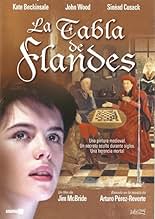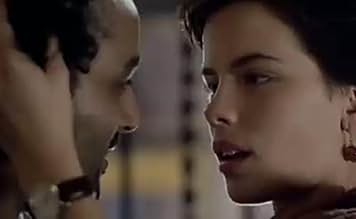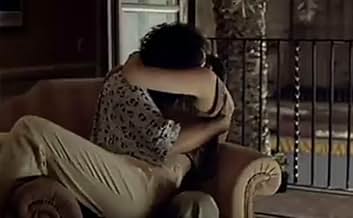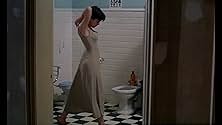NOTE IMDb
5,7/10
2,9 k
MA NOTE
Ajouter une intrigue dans votre langueA woman finds a hidden message in a restored painting questioning a knight's death. When her friend is murdered investigating it, a chess game's moves in the painting link to killings from t... Tout lireA woman finds a hidden message in a restored painting questioning a knight's death. When her friend is murdered investigating it, a chess game's moves in the painting link to killings from the past that she must solve.A woman finds a hidden message in a restored painting questioning a knight's death. When her friend is murdered investigating it, a chess game's moves in the painting link to killings from the past that she must solve.
- Réalisation
- Scénario
- Casting principal
Sinéad Cusack
- Menchu
- (as Sinead Cusack)
Julian Martínez
- Duke Ferdinand
- (as Julián Martínez)
Isabel van Unen
- Beatrix of Burgundy
- (as Isabel Van Unen)
Josuè Guasch
- Messenger
- (as Josue Guasch)
Avis à la une
No question in my mind, there's no question that the vitality of film these days is in the hands of Spanish storytelling: layered narrative, magical deviations from causality, sex as physics. The beauty of woman and places deeply rooted to the elegance of understanding.
There are narrative notions and cinematic qualities being nurtured in this broad community that are worth nurturing by us through appreciation. Here's a project that when you sum it all up is a dreadful movie, but it knows what it is about in terms of some intelligent ideas. It just didn't have the talent to match those ideas.
Here's the deep spine which is attempted: Pérez-Reverte writes mystery stories in a magical realism tradition. His device is usually to play between the happening of a thing and the representation of that happening in a book or painting. The idea is to fold his representation (his book) into the story, reaping all sorts of storytelling advantages.
Once these layers are established, he can jump in and out of various levels, and so can we as readers and some of the main characters as they develop insight. Layers are narrative layers, story threads, time, and almost always abstraction layers in terms of creating events and creating laws behind those events.
But the books themselves have problems. The ideas in their construction are a whole lot more engaging than the books themselves. The actual skill at storytelling just isn't masterful enough to control, channel and exploit these conceptual tides that have been unleashed.
One of his books was made into a film by a true master filmmaker, Polanski, and starred someone who knows that rare trick of layered or folded acting, where you inhabit more than one layer at a time. You had to work at it, but "Ninth Gate" really is as good as its ideas, and the ideas are in that film are both richer and crisper than in the source book.
And now we have this film of another of Pérez-Reverte's works. A simpler book in key ways.
One change it makes is to relocate the story to Barcelona and Gaudi's architecture. He is our most "folded" architect, and that change shows some real understanding of what is at stake. The filmmaker here is the guy who best exploited the environmental fabric of New Orleans to transform a simple story into a pretty interesting film in "The Big Easy."
For some reason, he is unable to do the same here. I think he could have if he had more time to get into the rhythm of the place, which is less hedonistic than New Orleans but more achingly romantic; more poundingly African under a sunny, slightly mechanical nonchalance. The project could have used this, and it was in his power, but it eludes us this time.
And that lack of control extends to more mundane production elements. The balance between realism and theatrical stereotypes/architypes was lost, probably unachievable with this cast.
The cast centers on Kate Beckinsale as our surrogate detective, who really is alluring, and in precisely the way the project demands: physically, she is made here as befitting of the place: sloppy, casual (unshaven pits), boyish face, innocent questioner on the surface -- deeply sexual and possibly powerful underneath. But she couldn't deliver that last part, the power part. Indeed, any emotion is amateurish. I haven't really paid much attention to her later work. I think it about the same.
So. What we have is a parcel of really great ideas. Important, central ones if you love movies and seriously use them in building a life and life awareness. These are all here, but mostly implicit. You have to almost ignore the movie to see them.
But along the way, you get a pretty girl, the most intriguing city on the planet, and a painting that is worthy of its role.
Ted's Evaluation -- 2 of 3: Has some interesting elements.
There are narrative notions and cinematic qualities being nurtured in this broad community that are worth nurturing by us through appreciation. Here's a project that when you sum it all up is a dreadful movie, but it knows what it is about in terms of some intelligent ideas. It just didn't have the talent to match those ideas.
Here's the deep spine which is attempted: Pérez-Reverte writes mystery stories in a magical realism tradition. His device is usually to play between the happening of a thing and the representation of that happening in a book or painting. The idea is to fold his representation (his book) into the story, reaping all sorts of storytelling advantages.
Once these layers are established, he can jump in and out of various levels, and so can we as readers and some of the main characters as they develop insight. Layers are narrative layers, story threads, time, and almost always abstraction layers in terms of creating events and creating laws behind those events.
But the books themselves have problems. The ideas in their construction are a whole lot more engaging than the books themselves. The actual skill at storytelling just isn't masterful enough to control, channel and exploit these conceptual tides that have been unleashed.
One of his books was made into a film by a true master filmmaker, Polanski, and starred someone who knows that rare trick of layered or folded acting, where you inhabit more than one layer at a time. You had to work at it, but "Ninth Gate" really is as good as its ideas, and the ideas are in that film are both richer and crisper than in the source book.
And now we have this film of another of Pérez-Reverte's works. A simpler book in key ways.
One change it makes is to relocate the story to Barcelona and Gaudi's architecture. He is our most "folded" architect, and that change shows some real understanding of what is at stake. The filmmaker here is the guy who best exploited the environmental fabric of New Orleans to transform a simple story into a pretty interesting film in "The Big Easy."
For some reason, he is unable to do the same here. I think he could have if he had more time to get into the rhythm of the place, which is less hedonistic than New Orleans but more achingly romantic; more poundingly African under a sunny, slightly mechanical nonchalance. The project could have used this, and it was in his power, but it eludes us this time.
And that lack of control extends to more mundane production elements. The balance between realism and theatrical stereotypes/architypes was lost, probably unachievable with this cast.
The cast centers on Kate Beckinsale as our surrogate detective, who really is alluring, and in precisely the way the project demands: physically, she is made here as befitting of the place: sloppy, casual (unshaven pits), boyish face, innocent questioner on the surface -- deeply sexual and possibly powerful underneath. But she couldn't deliver that last part, the power part. Indeed, any emotion is amateurish. I haven't really paid much attention to her later work. I think it about the same.
So. What we have is a parcel of really great ideas. Important, central ones if you love movies and seriously use them in building a life and life awareness. These are all here, but mostly implicit. You have to almost ignore the movie to see them.
But along the way, you get a pretty girl, the most intriguing city on the planet, and a painting that is worthy of its role.
Ted's Evaluation -- 2 of 3: Has some interesting elements.
"Uncovered" is based on Arturo Pérez-Reverte's novel "The Flanders Panel". Julia Darro, a young art historian and restorer from Barcelona, is working on a fifteenth-century Flemish painting called "The Game of Chess", when she discovers a painted-over message reading "Quis Necavit Equitem?" (Latin for "Who killed the knight?") Julia begins to research the painting's background to discover the meaning of this inscription, and discovers that it relates to a 500-year-old murder mystery. She realises that the solution to the mystery is connected to the chess game being played in the picture, and knowing little of the game herself recruits Domenec, a talented local chess player, to assist her. Julia and Domenec, however, realise that they are in danger, as several people connected with their research are also murdered.
The central mystery is an intriguing and ingenious one, and well developed, although I could spot the identity of the murderer well before this was announced on screen. There are no really outstanding acting performances, but the lovely Kate Beckinsale makes a charming heroine (although I could never work out why she sneezes so much). Kate is one of the few actresses who can get away with wearing her hair boyishly short and still look strikingly beautiful.
One criticism I have heard is that although the main characters are all supposed to be Spanish they all speak English without foreign accents. This, however, is not something which has ever worried me. The use of native British or American accents to represent foreigners' use of their own native languages is something I find perfectly acceptable. Charlton Heston's El Cid, for example, was also a Spaniard, and nobody complains that he speaks English like an American rather than like Manuel in "Fawlty Towers".
This is one of the few films to take an interest in chess and art history, two rather intellectual pursuits, and it does so in such a way as to make both those subjects seem interesting, even glamorous, featuring a romance between a beautiful young art historian and a handsome chess genius. It makes good use of its setting, with some wonderful views of the city of Barcelona, especially the architecture of Antoni Gaudi. (One of the characters lives in an apartment in Casa Batlló, and Julia and Domenec first meet in Park Güell).
Although this film was an Anglo-Spanish co-production, and stars a well-known English actress, it is curiously unknown in Britain. Although it is nearly twenty years since it was made, I have never seen it on television here, and it is available on DVD in the US but not in the UK. Yet it is, I think, a film which deserves to be better-known. 7/10
The central mystery is an intriguing and ingenious one, and well developed, although I could spot the identity of the murderer well before this was announced on screen. There are no really outstanding acting performances, but the lovely Kate Beckinsale makes a charming heroine (although I could never work out why she sneezes so much). Kate is one of the few actresses who can get away with wearing her hair boyishly short and still look strikingly beautiful.
One criticism I have heard is that although the main characters are all supposed to be Spanish they all speak English without foreign accents. This, however, is not something which has ever worried me. The use of native British or American accents to represent foreigners' use of their own native languages is something I find perfectly acceptable. Charlton Heston's El Cid, for example, was also a Spaniard, and nobody complains that he speaks English like an American rather than like Manuel in "Fawlty Towers".
This is one of the few films to take an interest in chess and art history, two rather intellectual pursuits, and it does so in such a way as to make both those subjects seem interesting, even glamorous, featuring a romance between a beautiful young art historian and a handsome chess genius. It makes good use of its setting, with some wonderful views of the city of Barcelona, especially the architecture of Antoni Gaudi. (One of the characters lives in an apartment in Casa Batlló, and Julia and Domenec first meet in Park Güell).
Although this film was an Anglo-Spanish co-production, and stars a well-known English actress, it is curiously unknown in Britain. Although it is nearly twenty years since it was made, I have never seen it on television here, and it is available on DVD in the US but not in the UK. Yet it is, I think, a film which deserves to be better-known. 7/10
This is a 1994 British/Spanish/French co-production film titled ¨The Flandes panel¨ or ¨ Uncovered¨, starring Kate Beckinsale and John Wood, it is a cinematic adaptation of the bestseller novel about a mystery spanning from the 15th century to the present day . It deals with Julia (Kate Beckinsale) , an art restorer and evaluator living in Barcelona . While restoring an old painting showing two men and a woman playing chess , Julia discovers a text underneath the paint which reads "Quis Necavit Equitem", written in Latin (English: "Who killed the knight?"). The owner (Michael Gough) of the painting tells her that one of his forefathers was murdered , the painting might identify the killer . She consults a gypsy named Domenec (Behan) , a quiet local chess master , who reconstructs the game from the painting . When Julia's friends are killed she understands that there is more to it and with any piece she takes , somebody dies . With the help of a chess genius and her old friend as well as father-figure , an antiques dealer named César (John Wood) , Julia works to uncover the mystery of a 500-year-old murder . At the same time , however , Julia faces danger of her own ; as several people helping her along her search are also killed .
Thrilling suspense movie packs thrills , violence , intriguing events , gruesome slaying , nudism and winds up into an astonishing finale . Passable whodunit in which a beautiful young girl discovers a painted-over message on a 1471 Flemish masterpiece called ¨The Chess Game¨, while a serial killer executes gruesome murders and subsequently the art restorer attempts to resolve it . Exciting and stirring development , though predictable , when starring finds that his fellows , friends and relatives are being murdered one by one . This is an acceptable thriller but contains several flaws and gaps , in fact there was trouble brewing on the set because of overages and creative concerns between the director , writer and the studio . It is based on a novel written by Spanish author Arturo Pérez-Reverte in 1990 . Reverte is a Spanish journalist and TV reporter, who turned to writer and today the best-selling author in Spain and the best-selling Spanish author in the world . Famous author of "Alatriste" novels as he carried out quite a lot of the work of investigating historical documents relating to 17th Century Madrid. His novels have the common thread of being based on real historical times and that in each case a great deal of investigation goes into the making of his stories, as well as the fact that he has had to learn a great deal on topics ranging from chess-playing to historical first-editions from 16th Century Dutch masters to Informatics and even swordsmanship . His extraordinary imaginative abilities have been able to produce well-written adventure stories , being adapted for cinema the following novels : ¨The Fencing Master¨ , ¨Territorio Comanche¨ , ¨The ninth gate¨ , ¨Cachito¨ , ¨Gitano¨ and ¨Carta Esferica .
Regular acting by a very young and without experience Kate Beckinsale as Julia , a restorer who comes undone after witnessing brutal murders on her way . Very good support cast though really wasted , all of them play weird people varying from psychotically aggressive , paranoids , drunken and killer ; being performed by Sinéad Cusack , Peter Wingfield , Helen McCrory , Michael Gough , Art Malik and James Villiers . Anti-climatic and inappropriate musical score by Philippe Sarde . Evocative cinematography by Alfonso Beato , but an alright remastering being necessary because of the copy of the film is worn-out . Shot on location in Canet de Mar (Castle) and Barcelona where appears several touristic palaces and monuments such as Park Güell , Casa Mila and Sagrada Familia Cathedral . This intrigue movie was ordinarily directed and with no originality , by Jim McBride . He is an American director and writer, known for Great balls of fire (1989), Big Easy (1986) , Breathless (1983) , The wrong man (1993) and The informant (1997) . Rating : 5.5/10 , average .
Thrilling suspense movie packs thrills , violence , intriguing events , gruesome slaying , nudism and winds up into an astonishing finale . Passable whodunit in which a beautiful young girl discovers a painted-over message on a 1471 Flemish masterpiece called ¨The Chess Game¨, while a serial killer executes gruesome murders and subsequently the art restorer attempts to resolve it . Exciting and stirring development , though predictable , when starring finds that his fellows , friends and relatives are being murdered one by one . This is an acceptable thriller but contains several flaws and gaps , in fact there was trouble brewing on the set because of overages and creative concerns between the director , writer and the studio . It is based on a novel written by Spanish author Arturo Pérez-Reverte in 1990 . Reverte is a Spanish journalist and TV reporter, who turned to writer and today the best-selling author in Spain and the best-selling Spanish author in the world . Famous author of "Alatriste" novels as he carried out quite a lot of the work of investigating historical documents relating to 17th Century Madrid. His novels have the common thread of being based on real historical times and that in each case a great deal of investigation goes into the making of his stories, as well as the fact that he has had to learn a great deal on topics ranging from chess-playing to historical first-editions from 16th Century Dutch masters to Informatics and even swordsmanship . His extraordinary imaginative abilities have been able to produce well-written adventure stories , being adapted for cinema the following novels : ¨The Fencing Master¨ , ¨Territorio Comanche¨ , ¨The ninth gate¨ , ¨Cachito¨ , ¨Gitano¨ and ¨Carta Esferica .
Regular acting by a very young and without experience Kate Beckinsale as Julia , a restorer who comes undone after witnessing brutal murders on her way . Very good support cast though really wasted , all of them play weird people varying from psychotically aggressive , paranoids , drunken and killer ; being performed by Sinéad Cusack , Peter Wingfield , Helen McCrory , Michael Gough , Art Malik and James Villiers . Anti-climatic and inappropriate musical score by Philippe Sarde . Evocative cinematography by Alfonso Beato , but an alright remastering being necessary because of the copy of the film is worn-out . Shot on location in Canet de Mar (Castle) and Barcelona where appears several touristic palaces and monuments such as Park Güell , Casa Mila and Sagrada Familia Cathedral . This intrigue movie was ordinarily directed and with no originality , by Jim McBride . He is an American director and writer, known for Great balls of fire (1989), Big Easy (1986) , Breathless (1983) , The wrong man (1993) and The informant (1997) . Rating : 5.5/10 , average .
A truly bad movie, from a generally good director like Jim McBride (I loved "Great Balls of Fire"). Based on a novel from Perez Reverte, this film is dull and uninteresting, and the only thing you can recommend from it is a nude scene from Kate Beckinsale (48 minutes after the start, so press your fast forward button in your video).
The story behind this movie is quite interesting. Perhaps for some the real mystery was obvious all along, but for me, it held my attention for the whole duration, and it took a second viewing to fully unravel the threads.
The real gem in this movie is Ms. Beckinsale. She is radiantly lovely throughout, and there is a strong sensuality about her that pervades the entire movie. And yes, those who long to see her unclothed will not be disappointed. Even with clothes on, though, she manages to exude this alluring aura that is irresistible.
The supporting cast is mixed. Perhaps the best is the investigating police detective, who is a classic. The gigolo guy is rather over the top.
I also wish they had not inserted those brief historical re-enactments, as they neither fit well into the narrative thread, nor are they in any way convincingly real.
The real gem in this movie is Ms. Beckinsale. She is radiantly lovely throughout, and there is a strong sensuality about her that pervades the entire movie. And yes, those who long to see her unclothed will not be disappointed. Even with clothes on, though, she manages to exude this alluring aura that is irresistible.
The supporting cast is mixed. Perhaps the best is the investigating police detective, who is a classic. The gigolo guy is rather over the top.
I also wish they had not inserted those brief historical re-enactments, as they neither fit well into the narrative thread, nor are they in any way convincingly real.
Le saviez-vous
- AnecdotesHelen McCrory's debut.
Meilleurs choix
Connectez-vous pour évaluer et suivre la liste de favoris afin de recevoir des recommandations personnalisées
- How long is Uncovered?Alimenté par Alexa
Détails
- Date de sortie
- Pays d’origine
- Langues
- Aussi connu sous le nom de
- La tabla de Flandes
- Lieux de tournage
- Sociétés de production
- Voir plus de crédits d'entreprise sur IMDbPro
- Durée1 heure 43 minutes
- Couleur
- Mixage
- Rapport de forme
- 1.66 : 1
Contribuer à cette page
Suggérer une modification ou ajouter du contenu manquant

Lacune principale
By what name was Qui a tué le chevalier? (1994) officially released in India in English?
Répondre














